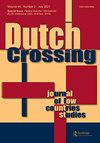Translation, Memory, and Ongoing Coloniality: Reading Gentayangan for a More Worldly Dutch Studies
IF 0.4
3区 历史学
Q1 HISTORY
Dutch Crossing-Journal of Low Countries Studies
Pub Date : 2022-11-24
DOI:10.1080/03096564.2022.2144598
引用次数: 0
Abstract
ABSTRACT Responding to De postkoloniale spiegel and De nieuwe koloniale leeslijst, this article exposes how few Indonesian voices are heard in conversations on colonial history in the Netherlands today. Representations of the Dutch East Indies as colony prevail over conceptions of Indonesia as independent nation. Through a reading of Gentayangan by Intan Paramaditha, we decentre readings of colonial literature in Dutch Studies by turning to Indonesian literature in translation. Like colonial indies literature preoccupied with nostalgia, this book is also haunted by memory, but of a different anti-colonial character. As Paramaditha’s character journeys around the world she is discomforted by Dutch nostalgia for tempo doeloe in the Netherlands, but finds solidarity in encounters with other wanderers who have faced colonization and racialized oppression in different contexts. In our reading of this text in translation, we lean on theories in memory studies to consider: How might Gentayangan as a demonstration of ongoing coloniality support the shift towards a more worldly approach in Dutch Studies? Are postcolonial re-readings from Western loci of meaning-making enough – as found in Spiegel and Leeslijst – or are there more innovative ways to decolonize Dutch Studies by implicating oneself in the power dynamics of ongoing coloniality?翻译,记忆,和持续的殖民:阅读根塔扬甘为一个更世界性的荷兰研究
作为对《后科隆spiegel》和《新科隆leeslijist》的回应,本文揭示了今天在荷兰关于殖民历史的对话中很少听到印尼的声音。荷属东印度群岛作为殖民地的说法压倒了印度尼西亚作为独立国家的概念。通过阅读Intan Paramaditha的《Gentayangan》,我们将殖民文学的阅读从荷兰研究转向印度尼西亚文学的翻译。就像殖民地独立文学充斥着怀旧情绪一样,这本书也被记忆所困扰,但具有不同的反殖民特征。当Paramaditha扮演的角色周游世界时,她对荷兰人对tempo doeloe的怀念感到不安,但在遇到其他在不同背景下面临殖民和种族压迫的流浪者时,她发现了团结。在我们阅读这篇翻译的文章时,我们依靠记忆研究中的理论来思考:根塔扬甘作为持续殖民的例证,如何支持荷兰研究向更世俗的方法转变?像Spiegel和Leeslijst所发现的那样,对西方意义创造基因的后殖民重新解读是否足够了,或者是否有更多的创新方法通过将自己卷入持续殖民的权力动态中来实现荷兰研究的非殖民化?
本文章由计算机程序翻译,如有差异,请以英文原文为准。
求助全文
约1分钟内获得全文
求助全文

 求助内容:
求助内容: 应助结果提醒方式:
应助结果提醒方式:


